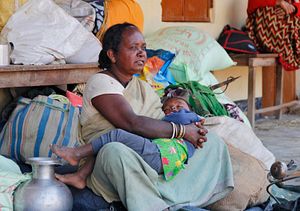India’s preparations for Christmas were halted late on Tuesday night last week after an attack by the National Democratic Front of Bodoland (NDFB), a separatist outfit operating in the Northeastern state of Assam killed more than 70 people, among them women and children.
Tuesday’s attack was the latest by the NDFB, an outfit that is striving to create a separate homeland for the Bodo people from the state of Assam. Designated a terrorist organization by the Indian government, the NDFB has been held responsible for dozens of such attacks over a period of nearly two decades, claiming the lives of hundreds of Indian citizens.
Assam has become the focal point of a growing internal security problem in India’s northeast with increasing ethnic tensions between the state’s indigenous people and the Muslim population, with many of the latter group being accused of being “infiltrators” or illegal migrants from neighboring Bangladesh.
The NDFB and the United Liberation Front of Assam (ULFA), another militant outfit that sought to establish an independent Assam, have been guilty of instigating and carrying out the most brutal of these attacks targeting civilians. Last week’s attack saw NDFB armed rebels entering the huts of local teagarden workers and opening fire.
India’s government has also struggled to make a distinction between Indian descendants of East Bengali migrants brought for manual labour to Assam during the British era and peasants who have crossed the border illegally after independence from Bangladesh, which is modern day East Bengal.
The government even went as far as establishing an Illegal Migrant Determination Tribunal in 1983 with the objective of identifying and expelling illegal migrants back to Bangladesh. While the tribunal and the legislation that created it sought to enforce safeguards to protect the states minority population, it was struck down by India’s Supreme Court in 2005. The court stated that the legislation had become “the biggest hurdle” in the identification and deportation of illegal migrants from the state.
The NDFB was formed by Ranjan Daimary in 1986. In the following decade, the group earned notoriety for the sheer brutality of their campaign.
In 2000, the group bombed two trains in separate incidents killing more than 25 passengers. They were also responsible for the assassination of Bodo writer and poet Bineshwar Brahma in August the same year. Brahma had worked to promote peace building efforts in the state and was against the adoption of the Roman script for the Bodo language, a primary demand of the NDFB.
In 2009, the group carried out another attack in the village of Bhimjauli, killing 12 people in what has come to be known as the “Bhimjauli massacre.” Divisions within the group subsequently led to a split and the creation of “pro-talks” and “anti-talks” factions.
In May this year, the NDFB was held responsible for a series of attacks that claimed the lives of 32 people in Assam’s Baksa and Kokrajhar districts. Indian security forces responded by stepping up counter-insurgency operations and clashes resulted in the death of more than 40 NDFB cadres.
Last week’s attacks are being described as “revenge” for these crackdowns and may have particularly targeted villagers, whom the group has accused of being responsible for compromising their location and hideouts.
Indian Prime Minister Narendra Modi called the attack “an act of cowardice.” India’s Home Minister Rajnath Singh visited the state and met with Chief Minister Tarun Gogoi.
Reports have also noted that the government is planning to deploy more paramilitary troops in Assam with the chief minister stating that “neither the Government of India nor the Government of Assam will surrender to these militant groups.”
Kiran Mohandas Menon is an independent researcher from India. His articles have been featured in various international publications.

































